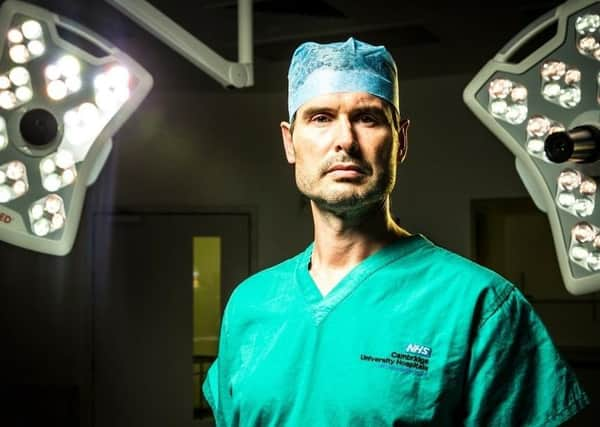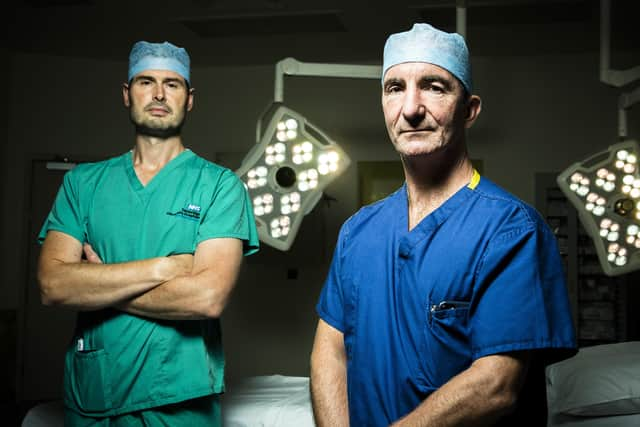NI surgeon overcomes his own childhood trauma to help others in pain


Andrew Carrothers is a surgeon in demand so I was extremely grateful when he found time to call me last week in between two high pressure operations.
The Northern Irish man has risen to fame after appearing in BBC Two documentary Surgeons: At The Edge Of Life and his specialist skills in the field of trauma surgery mean his schedule is a demanding one.
Advertisement
Hide AdAdvertisement
Hide Ad“We’re ready to go with another hip replacement in around 15 minutes so if it suits you we can talk now,” he said, adding: “I’ve just nipped out of the theatre so hopefully the signal is okay.”


For a man in such a highly-stressed, life-changing profession, Andrew was extremely relaxed, chatty, humorous and engaging.
It was also nice to hear he hadn’t lost his Co Fermanagh accent despite having lived away from home since he started university in England in 1996.
Andrew and his siblings Derek and Angela were born and raised in Brookeborough by their mother Phyllis and father Dougie, an RUC reservist.
Advertisement
Hide AdAdvertisement
Hide AdThe Carrothers family had been advised by the authorities to move from their home after retired RUC Reservist Cullen Stevenson, who was a close family friend, was murdered in the area.
It was not long after the family moved to Lisbellaw that Dougie was murdered by the PIRA using an under car booby trap bomb.
Andrew said the trauma of his father’s death eventually lead him into the field of surgery: “I was 14, my dad was only in his early forties.
“Those were my formative years, but you have to make appropriate choices in life, you either pile in and do the wrong thing or you can take inspiration.
Advertisement
Hide AdAdvertisement
Hide Ad“For me it was my dad, and to try and take good out of some awful situations.
“That’s been a driving force in my life. I’ve got a 10-year-old called Dougie and a seven-year-old called Molly. They’re very aware of their granddad Dougie and the work ethic and the family values.”
Asked if he’d ever contemplated retaliation in his teenage years, Andrew said: “It’s human nature to just feel so empty in life, that’s one of the things that comes across anyone’s mind.
“That’s not what my dad would have wanted, and that’s not what my mum would have wanted. You have to pick up the pieces and move on.
Advertisement
Hide AdAdvertisement
Hide Ad“My mum has been a fantastic rock throughout the whole situation. She brought up three kids after my dad was murdered and carried on the mantle so to speak. We owe her a lot.”
Andrew’s sister Angela is a GP in Darlington while his brother is an electronic engineer living in Crossgar.
Asked if it was a coincidence that two family members are involved in jobs preserving life, he said: “I don’t think that’s a coincidence, I can’t speak for my sister, but these sort of choices come after trials and tribulations.
“There’s no doctors or surgeons in the family. I was the first to go to university in the wider circle of family, the rest is history so to speak.”
Advertisement
Hide AdAdvertisement
Hide AdHaving left Northern Ireland to go to university in Manchester in 1996 Andrew ended up as a military surgeon in Iraq and Afghanistan.
He said: “You talk about the things that surgeons do or are exposed to in these war zones. Yes, there’s that, but the real heroes are the young lads who are putting themselves in harm’s way doing a job.
“We looked after a lot of the indigenous populations in Iraq and Afghanistan, there were many children who had come in after standing on landmines. It’s the casualties of war across all streams that are the victims in life.
“I’ve often reflected on that in life, that’s basically what we were as children when we were exposed to the tragedies of Northern Ireland. We were a victim of the war that was ongoing.”
Advertisement
Hide AdAdvertisement
Hide AdAndrew has been at Addenbrooke’s Hospital in Cambridge since 2012 as a consultant orthopaedic surgeon specialising in trauma and reconstructive surgery.
His pioneering work to help cancer patients enjoy a better quality of life featured on BBC Two last Tuesday.
Commenting on having TV cameras in the theatre for an operation he said: “This is a fairly complex operation with high risk so like any surgeon you mentally rehearse these things through and through.
“You never know what you’re going to get until you’re actually doing the operation for sure, by that stage I had rarely contemplated the cameras being there.
Advertisement
Hide AdAdvertisement
Hide Ad“They’re all rigged up in theatre and there’s only one cameraman in theatre with the team to minimise the number of personnel in the theatre for infection risk.
“Of course it would be crazy to say you weren’t aware of what was going on and the perceptions, because things don’t always go according to plan when you’re doing these complex, high risk operations you anticipate some potential issues or badness along the way.
“You’re exposing yourself by putting this on TV, but obviously the patient is at the centre of everything you do. They were clearly very much on board with the whole programme and in fact encouraged me to do it for the reasons of widening the exposure.
“One of my things in this is that there are a lot of cancer patients out there who are probably having a fairly miserable end of life when the cancer is taken away from the hip joints or the pelvis.
Advertisement
Hide AdAdvertisement
Hide Ad“It’s not without risks, but there are operations, and this is one of them, that aim to give patients back quality of life and the ability to mobilise.
“It’s a palliative operation so the cancer is not treatable at this stage, you want to give that person the opportunity to live their life and have quality right up to the bitter end.
“We’re not designed to be bed bound, we get bed sores, chest infections and waterworks infections and all this sort of thing. That sort of death is really miserable.
“If they’re able to live their life and be with their families in a meaningful way until the cancer takes that from them then it’s a great opportunity to be able to help these patients I think.”
Advertisement
Hide AdAdvertisement
Hide AdAndrew said the long hours and demanding nature of his job meant he didn’t have a great work-life balance.
However when possible Andrew likes to bring his family, who were all born in England, over to the Province.
He said: “My wife Liz is a huge driving force. She’s passionate about Northern Ireland and our history and our children being exposed to it too.
“She’s a girl from Chester, she’s the one who organises things to get us back to Fermanagh and couple of times a year.
Advertisement
Hide AdAdvertisement
Hide Ad“Behind every busy person in life there’s a huge team of people. Liz is my rock in that regard, she makes sure the family is still functioning so I can get on with life and feature in BBC documentaries and that kind of thing.”
Asked what a busy surgeon does in his spare time, Andrew said: “I like getting out and up the hills. I do a bit of running early in the morning when it’s still dark, to clear the day and think about the day that’s coming.
“I still think I play rugby but I don’t. I take Dougie to rugby, I’m passing that on. My little girl goes to ballet and golf.”
Of his job he said: “I live a fairly high pressured and high stressed life, but it’s an extremely rewarding job. By and large patients are very grateful.
Advertisement
Hide AdAdvertisement
Hide Ad“It’s one of the main reasons I chose the trauma side of things, to help people. When these patients come into clinic and tell you that it’s changed their life that’s a very rewarding place to be. I’ll take the rough and the smooth together to be in that position.”
Andrew’s mother Phyllis was proud to see her son on TV, but it brought home the reality that her husband wasn’t here to share the moment.
She said: “I’m so proud of him and what he has achieved, not only of his professional achievements but of his humility, I think that came across. He’s just a wonderful lad. He hasn’t lost his Fermanagh humour that’s for sure. It made me smile, I cried a lot too.
“I’m very proud of his brother Derek and sister Angela too. I’m just so grieved their dad was deprived of sharing in these achievements.
Advertisement
Hide AdAdvertisement
Hide Ad“He’d have been so proud of his three children and indeed their spouses and their seven lovely grandchildren, two of whom carry Dougie’s name.”
Phyllis, who is now living in Co Durham, said: “Dougie gave them a good grounding in their start to life. God has kept his hand upon them, there’s no doubt about that.
“With all the pride and everything else it has just exacerbated the loss of my husband. I watched Andrew on TV on my own, Dougie should have been with me.”
The documentary in which Andrew features was filmed in early March.
Advertisement
Hide AdAdvertisement
Hide AdHe said: “There was the rumblings of Covid happening. We had the opportunity to get this operation done for the patient and to allow him to get on with his life for whatever the remainder was. He was very grateful and so were his family.”
• Surgeons: At the Edge of Life continues tomorrow at 9pm on BBC Two. Catch up on BBC iPlayer